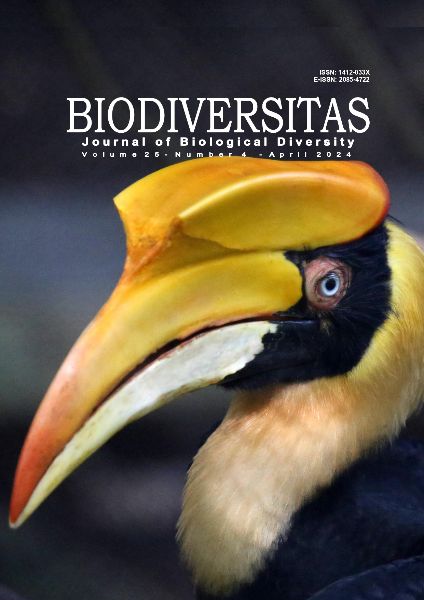Screening of the antimicrobial activity of Indonesian banana (Musa spp.) against pathogenic bacteria
##plugins.themes.bootstrap3.article.main##
Abstract
Abstract. Sa’diyah H, Hariyadi YDP, Ubaidillah M, Sari VK. 2024. Screening of the antimicrobial activity of Indonesian banana (Musa spp.) against pathogenic bacteria. Biodiversitas 25: 1368-1374. Investigation of natural sources of antibacterials becomes increasingly relevant and necessary due to the prevalence of high antibiotic resistance. To mitigate this issue, banana, a consumable fruit, is gaining attention as a potential natural source of antibacterials, with some varieties showing potential as alternatives to conventional antibiotics against pathogens. Exploring the potential for non-commercial bananas is important to discovering their antibacterial properties. Therefore, this study aimed to evaluate the antibacterial activity of 23 explored banana varieties against Escherichia coli, Salmonella typhi, Staphylococcus aureus bacteria using the diffusion disc method. The results showed that all the different types of banana did not significantly affect the antibacterial activity. Kayu banana variety indicated the highest activity against E. coli. In contrast, Ijo banana showed potent activity against S. aureus with a non-significantly different inhibition zone than the effectiveness of ampicillin. Meanwhile, Kepok Makassar banana variety showed the highest antibacterial activity against S. typhi, which was lower than chloramphenicol's effectiveness. The Raja Nangka, Morosebo, Janten, Selendang, and Biji Seribu banana varieties had low antibacterial activity against all three bacteria tested. Therefore, the results showed opportunities for further study of various bacterial types with different banana varieties and their extracts.


 https://orcid.org/0000-0003-4745-3878
https://orcid.org/0000-0003-4745-3878